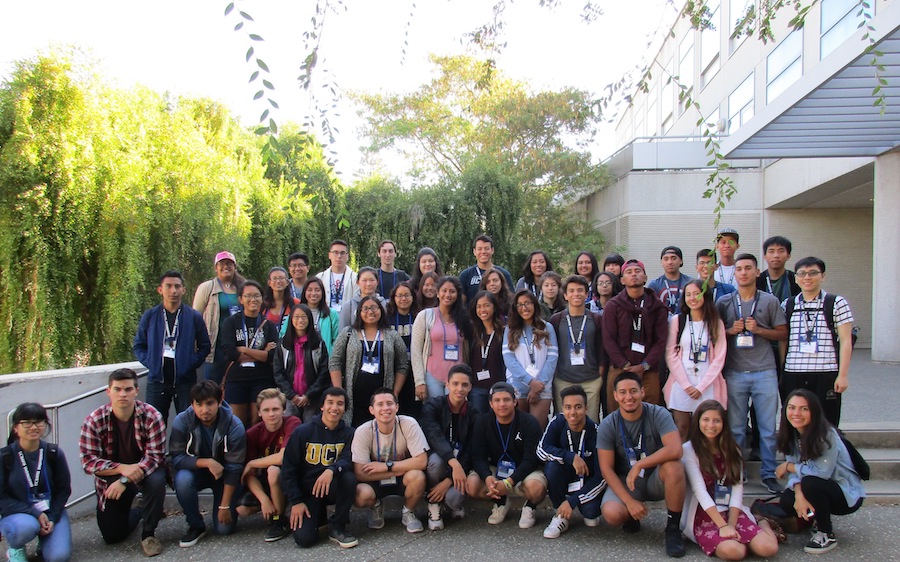
How building a community in engineering is keeping students in college, providing resources, networks
UC Davis prides itself in keeping students in school, and with a 90 percent first-year and 86 percent transfer-student retention rate, it’s earned the right to be proud. One of the ways that UC Davis keeps students from dropping out is through specialized retention programs like Leadership in Engineering Advancement, Diversity and Retention (LEADR), a group specifically designed for first-generation engineering students.
“[LEADR] was actually a request from our then College of Engineering dean, Enrique Lavernia, who wanted our college to have a diversity program,” said Tanya Whitlow, the director and founder of LEADR.
Whitlow clarified the difference between LEADR and a similar summer program called Special Transitional Enrichment Program (STEP), meant for first-generation students of all majors.
“We work closely with STEP […] We advise [their engineering students] and also have workshops for them during their [summer program],” Whitlow said. “That’s what prompted us to think about creating our own summer bridge program, because we realized that with STEP, we were working with an average of 35 students a year. We don’t know [which populations we weren’t reaching]. We just knew that there weren’t just 35 first-generation engineering students.”
The pilot LEADR summer program launched the week before the start of the 2016 to 2017 academic year. A central goal of the program was to expose students to successful professional engineers for advice and inspiration.
“We wanted to concentrate on information that would help them both professionally and academically to give them some early exposure to professional development. Both AT&T and Chevron, [who] fund our program, held professional development workshops,” Whitlow said. “They talked about things like building your resume, interview tips, information about their companies and what engineering positions are available at their companies.”
In addition to offering practical advice, Whitlow wanted the program to encourage student unity within LEADR.
“We wanted them to be able to build communit[ies], like they could in the STEP program [and] have a peer network […] that you can go to class with or study with, and be familiar with the resources both on campus and in the college, so you know where to go if you need assistance,” Whitlow said.
The groundwork for networking seems to be successful, as students have become incredibly attached to the program.
“I remember when the program was about to end, it got kind of quiet because no one was really ready for it to end […] In fact, a student said, ‘can it be for another week?’” Whitlow said.
Maricella Miramontes, a fifth-year mechanical engineering major at UC Davis, was a Resident Mentor (RM) for the LEADR summer bridge program. Miramontes said that the RMs were with the students essentially 24 hours a day.
“We helped them move in the very first day [and got] them settled into the dorms,” Miramontes said. “We were [also] living there overnight.”
In addition to spending time with students at the workshops, held from 9 a.m. to 5 p.m., the RMs ate meals, went to the ARC and played board games with the students. These informal interactions were key in creating a sense of community, which is especially helpful for first-generation students.
“There’s a lot of pressure to graduate [for first-generation students],” Miramontes said. “And [frequently], parents don’t even know what engineering is, and you have to explain to them why you’re going into a very difficult field which sometimes takes more than four years, and it’s hard for them to understand that.”
Although the bridge program was just launched this past summer, LEADR has offered continued support during the academic year for a much longer period. Laura Hackett is the LEADR program advisor. In addition to facilitating weekly group meetings, Hackett meets one-on-one with students on a weekly, bi-weekly or quarterly basis. Hackett was recently awarded the 2016-17 Campus Outstanding New Advisor Award for her work in LEADR.
“I like to think of [these meetings] as getting to know the student better so the program can support them in the best way possible,” Hackett said. “I advise in a very goal-oriented manner, so I like to know what their goals are, and I like to help them achieve those goals.”
According to Hackett, when the program started, they had 31 students. Now, their listserv is just shy of 300 people. Although some are inactive, Hackett says that they have gotten to know most of the people in the program fairly well and that they are adding new students every year.
Despite the increase in students in LEADR, Hackett said she hopes that students feel free to ask for individual help.
“I hope that every student feels welcome. I hope that they feel welcome in my office, I hope that they feel comfortable in the college of engineering,” Hackett said. “Just know that there are people on campus that want to help, and that the main thing for students is just to ask for help when you need it, because there are […] people who [will] pick you up.”
Written by: Meral Basit – science@theaggie.org



